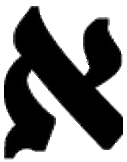Jewish Curriculum

An important component of our daily curriculum is Jewish. Not all of our children or families come from a Jewish background. Our staff is sensitive to the needs of all families, and we make every effort for our entire Glasser Preschool family to be comfortable with this part of our curriculum.
Parent education newsletters are sent home throughout the year regarding the Jewish holidays and Hebrew used in the classroom. There is a balance between the Jewish calendar and concepts and the everyday lives and interests of the children of the class. The following Jewish holidays are addressed in all of our classrooms: Shabbat, Rosh Hashanah, Yom Kippur, Sukkot, Simchat Torah, Hanukkah, Tu B’Shvat, Purim and Pesach. How these holidays are covered will vary depending on the interests and developmental stage of the children in each classroom. |

Ivrit (Hebrew) is being used daily in every classroom in our school. As you know, children have the ability to learn several languages simultaneously merely by being exposed to them in interactive situations on a regular basis. We are all born with this talent. (Unfortunately, it starts to fade at age twelve, and by the age of sixteen it has all but disappeared.) Studies show that learning a second language early in life is beneficial in many ways, regardless of whether the language is used later in childhood. The strangest thing about learning a language through daily interaction is that it is easier the younger you are!
Ivrit is being taught differently in our school to each age group, but the overall basic idea is teaching and learning through immersion. In a setting like ours, which is not a total immersion setting, it is important to have some kind of curriculum. Again, the children learn through interaction, songs, and rhymes. Do you need to do be part of this? NOT AT ALL! We are merely letting you in on our curriculum, so that those of you who choose to do so can easily reinforce Ivrit at home.
As we start using our Hebrew curriculum, we will send it home to you, so that you can learn with your child and reinforce the vocabulary. It can be as simple as saying Boker tov! (Good morning!) when you wake up instead of or in addition to “Good morning!” in English. It can be as simple as using one, only one, Hebrew word in a whole phrase. For example: let’s go to the bathroom and wash our yadayim (hands)! Consistency helps, so why not always say Mr. Shemesh when you talk about Mr. Sun? It is fun to substitute one Hebrew word for an English word in a famous line: ”Somewhere over the keshet” As we try to make this a fun experience for your yeladim (children), we hope you will enjoy it as well.
Ivrit is being taught differently in our school to each age group, but the overall basic idea is teaching and learning through immersion. In a setting like ours, which is not a total immersion setting, it is important to have some kind of curriculum. Again, the children learn through interaction, songs, and rhymes. Do you need to do be part of this? NOT AT ALL! We are merely letting you in on our curriculum, so that those of you who choose to do so can easily reinforce Ivrit at home.
As we start using our Hebrew curriculum, we will send it home to you, so that you can learn with your child and reinforce the vocabulary. It can be as simple as saying Boker tov! (Good morning!) when you wake up instead of or in addition to “Good morning!” in English. It can be as simple as using one, only one, Hebrew word in a whole phrase. For example: let’s go to the bathroom and wash our yadayim (hands)! Consistency helps, so why not always say Mr. Shemesh when you talk about Mr. Sun? It is fun to substitute one Hebrew word for an English word in a famous line: ”Somewhere over the keshet” As we try to make this a fun experience for your yeladim (children), we hope you will enjoy it as well.

